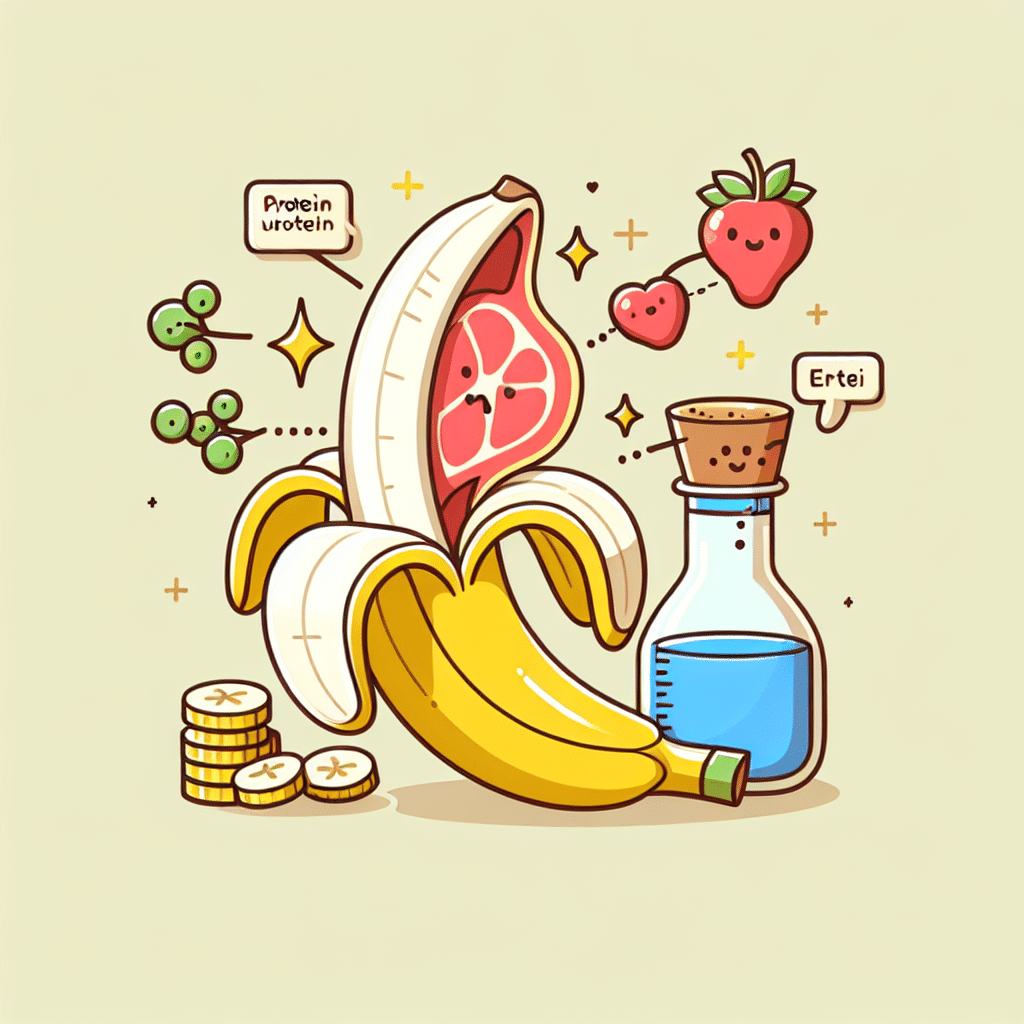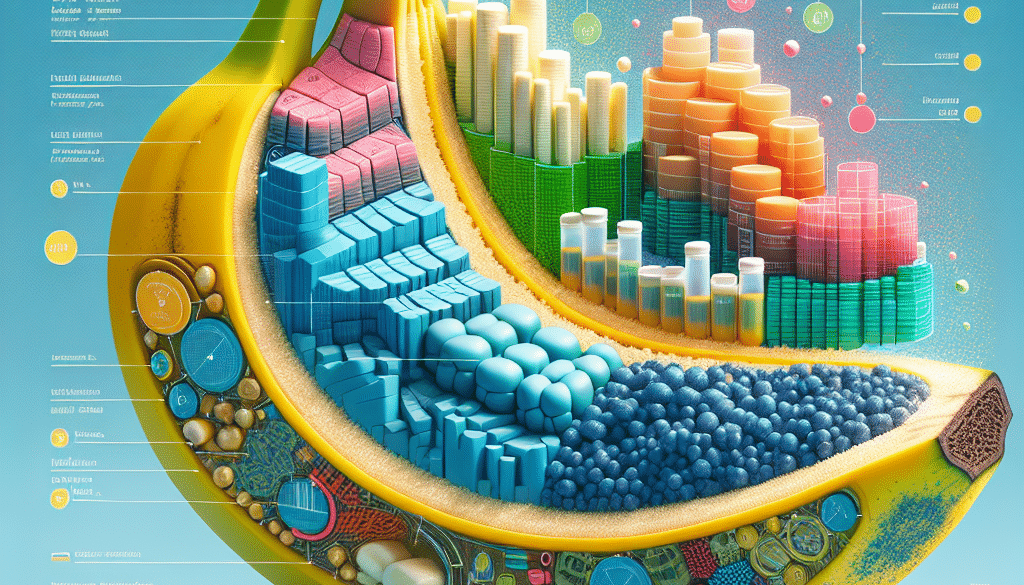Cu??nta Prote??na Tiene un Pl??tano: Nutrici??n Descubierta
-
Table of Contents
- Protein Content in Bananas: Unveiling the Nutritional Facts
- Understanding the Nutritional Profile of Bananas
- Protein Content in a Single Banana
- Other Nutritional Benefits of Bananas
- Comparing Bananas to Other Protein Sources
- Role of Bananas in a High-Protein Diet
- Incorporating Bananas into Your Diet
- Understanding the Bigger Picture: Protein in a Balanced Diet
- Meeting Your Daily Protein Needs
- Conclusion: The Role of Bananas in Nutritional Health
- Discover ETprotein’s High-Quality Protein Products
Protein Content in Bananas: Unveiling the Nutritional Facts

When it comes to discussing the nutritional value of fruits, bananas are often highlighted for their high potassium content and their role in providing quick energy due to their carbohydrate content. However, one question that often arises is: How much protein does a banana contain? This article delves into the nutritional profile of bananas, with a focus on their protein content, and explores the broader context of how this popular fruit fits into a balanced diet.
Understanding the Nutritional Profile of Bananas
Bananas are a staple fruit enjoyed worldwide for their convenience, taste, and nutritional benefits. They are a significant source of vitamins, minerals, and dietary fiber. But when it comes to protein, bananas are not typically recognized as a high-protein food.
Protein Content in a Single Banana
The amount of protein in a banana is relatively low. On average, a medium-sized banana (about 118 grams) contains approximately 1.3 grams of protein. This represents about 2-3% of the daily protein requirement for an average adult, which is significantly less than what is found in other food sources such as meat, dairy, legumes, and nuts.
Other Nutritional Benefits of Bananas
- Potassium: Bananas are well-known for their high potassium content, which is essential for maintaining normal blood pressure and heart function.
- Vitamin C: They also provide a good amount of vitamin C, an antioxidant that helps protect your body against cell damage.
- Dietary Fiber: The dietary fiber in bananas can aid digestion and help prevent constipation.
- Vitamin B6: Bananas are a rich source of vitamin B6, which is important for brain health and metabolism.
- Carbohydrates: As a source of carbohydrates, bananas provide energy that is easily accessible to the body, making them a great pre-workout snack.
Comparing Bananas to Other Protein Sources
When considering protein intake, it’s important to compare bananas to other common sources of protein. Foods such as chicken breast, fish, tofu, beans, and nuts contain significantly more protein per serving than bananas. For example, a 3-ounce serving of chicken breast contains about 26 grams of protein, which is about 20 times the amount of protein in a medium-sized banana.
Role of Bananas in a High-Protein Diet
While bananas are not a high-protein food, they can still play a role in a high-protein diet. They can be paired with protein-rich foods such as Greek yogurt, peanut butter, or a protein shake to create a balanced snack or meal that includes both protein and the other nutritional benefits that bananas offer.
Incorporating Bananas into Your Diet
Bananas are incredibly versatile and can be included in your diet in various ways:
- As a quick on-the-go snack
- Sliced into oatmeal or cereal
- Blended into smoothies or protein shakes
- Baked into bread or muffins
- Frozen and dipped in dark chocolate for a healthy dessert
Understanding the Bigger Picture: Protein in a Balanced Diet
It’s essential to understand the role of protein within the context of a balanced diet. Protein is a macronutrient necessary for building and repairing tissues, making enzymes and hormones, and supporting immune function. The Recommended Dietary Allowance (RDA) for protein for the average adult is 0.8 grams per kilogram of body weight per day.
Meeting Your Daily Protein Needs
To meet your daily protein needs, it’s important to consume a variety of protein sources throughout the day. This can include animal-based proteins like meat, fish, and dairy, as well as plant-based proteins such as beans, lentils, tofu, and nuts. While bananas can contribute to your overall daily intake, they should not be relied upon as a primary source of protein.
Conclusion: The Role of Bananas in Nutritional Health
In conclusion, bananas are a nutritious fruit that offers a range of health benefits, but they are not a significant source of protein. They contain about 1.3 grams of protein per medium-sized banana, which is a small fraction of the daily protein requirements for an average adult. However, when included as part of a balanced diet that contains a variety of protein sources, bananas can contribute to overall health and well-being.
The key takeaways from this article are that while bananas are low in protein, they are rich in other nutrients such as potassium, dietary fiber, vitamin C, and vitamin B6. They can be enjoyed in many ways and can complement high-protein foods to create nutritious and balanced meals or snacks.
Discover ETprotein’s High-Quality Protein Products
If you’re looking to increase your protein intake, consider exploring ETprotein’s range of plant-based protein products. ETprotein is a reputable manufacturer and supplier of organic bulk vegan protein and plant proteins, offering products like organic rice protein, pea protein, and pumpkin seed protein, among others. Their products are non-GMO, allergen-free, and have a neutral taste, making them an excellent addition to any diet.
Whether you’re involved in sports nutrition, weight management, or simply looking for high-quality protein supplements, ETprotein has a solution for you. Their products are trusted by leading global food and beverage brands and Fortune 500 companies, ensuring that you’re getting the best in the market.
For more information or to sample their products, please contact ETprotein and email sales(at)ETprotein.com today.
About ETprotein:
ETprotein, a reputable plant protein vegan protein Chinese factory manufacturer and supplier, is renowned for producing, stocking, exporting, and delivering the highest quality organic bulk vegan protein and plant proteins. They include Organic rice protein, clear rice protein, pea protein, clear pea protein, watermelon seed protein, pumpkin seed protein, sunflower seed protein, mung bean protein, peanut protein etc. Their offerings, characterized by a neutral taste, non-GMO, allergen-free attributes, cater to a diverse range of industries. They serve nutraceutical, pharmaceutical, cosmeceutical, veterinary, as well as food and beverage finished product distributors, traders, and manufacturers across Europe, USA, Canada, Australia, Thailand, Japan, Korea, Brazil, and Chile, among others.
ETprotein specialization includes exporting and delivering tailor-made protein powder and finished nutritional supplements. Their extensive product range covers sectors like Food and Beverage, Sports Nutrition, Weight Management, Dietary Supplements, Health and Wellness Products, and Infant Formula, ensuring comprehensive solutions to meet all your protein needs.
As a trusted company by leading global food and beverage brands and Fortune 500 companies, ETprotein reinforces China’s reputation in the global arena. For more information or to sample their products, please contact them and email sales(at)ETprotein.com today.












